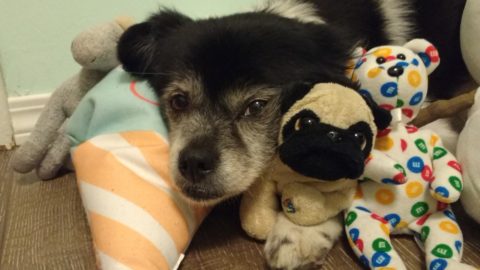Mourning and processing your grief will allow you to change the relationship with the tangible dog of fur and drool to a relationship with a dog within your own heart and mind. Your dog will always be there, as will your love.
–Grisha Stewart

Ever since I could toddle around on my own two feet, I have been obsessed with dogs. I read books about them, fantasized about them, and, when I grew strong enough to go after them, chased them down in the name of friendship. As you can imagine, I suffered a few bites. However, my love never wavered.
Then, one day when my children were old enough and my dog-neutral husband could be convinced, we adopted China through Saskatoon’s New Hope Dog Rescue. She had been brought to the city from a location near the Alberta border where she was found wandering by herself. She had previously been shot, and, I eventually suspected, tied up outdoors by herself for most of her young life. She was not terribly photogenic in those days, a bit shy, though not at all aggressive. No one seemed to want her, so, as is the case for so many strays, she had an appointment to be euthanized. A wonderful New Hope volunteer and dog trainer happened to be passing through on her way home from Edmonton and decided to check on the dogs in the shelter. She spotted China, perceived her gentle nature, and brought her home to Saskatoon. As soon as China passed her health inspection, her photo was posted to the New Hope website. That’s where I first laid eyes on her.

Research has confirmed that for most people, the loss of a dog is in almost every way comparable to the loss of a human loved one. Unfortunately, there’s little in our cultural playbook—no grief rituals, no obituary in the local newspaper, no religious service—to help us get through the loss of a pet, which can make us feel more than a bit embarrassed to show too much public grief over our dead dogs.
–Frank T. McAndrew, “Getting over Rover: Why the Loss of a Dog Can Be Devastating” (psychologytoday.com)
China was between one and three years old when she came to live with us. She and I bonded over long walks (her favorite thing to do, up until two days before she died). In fact, if I didn’t take her for at least a five kilometer walk, she would vocalize her disappointment. Other family members who tried to take her would complain that if they took a different path from what she was used to, China would leap and pull at the leash until they either went home out of frustration or complied with her wishes. At the dog park she was a compulsive herder of smaller dogs and chaser of larger ones. All this was done with a joyous heart, and if another dog didn’t like it, she would stop and wag her tail, as if to say, “Okay, let’s play your way then.” Inside the house she was very respectful of our belongings, including our furniture. Years later, she would continue to seek permission to jump on the sofa, even though we’d made it abundantly clear she was allowed. When Chip came into our lives, China policed his behavior and made sure his fetching play didn’t wear me out, letting him know when enough was enough. But even though she watched over him this way, she grew very attached.

If you don’t own a dog, at least one, there is not necessarily anything wrong with you, but there may be something wrong with your life.
–Roger A. Caras (Author, A Dog Is Listening: The Way Some of Our Closest Friends View Us)

China began showing signs of pain and was diagnosed with osteoarthritis. Pain medication helped, at first. About a week ago, she refused to eat, unless I fed her by hand. I picked up some tinned rabbit, topped off her kibble with it, and that seemed to do the trick. Then, two days ago, China didn’t want to go for a walk. Alarm bells went off in my mind. However, since Chip and I were both eager, China didn’t want to be left behind. It was very cold, with the windchill at about minus 25. Chip wore his parka, but China has always preferred cold weather. We were only out for fifteen minutes. Half an hour after returning home, China flopped on the floor in an odd position. She was breathing hard; in her eyes was a distant look.

I took China to the animal hospital, thinking her arthritis was far worse than we had thought, and that she might even have a neurological disease, something I raised with the vet at one time. But it turned out to be cancer, far along, and she was bleeding internally.
How f**king strong is a dog?! How consistent? How do you measure her ineffable loyalty?
Everything I know I learned from dogs.
–Nora Roberts
My relationship with China made me a better mother, a better friend, a better person. Period. From early childhood I sensed there was a dog friend waiting for me, someday, somewhere. As gushy as it sounds, there was.
At the end, I cradled her, and told her over and over how much I loved her. I have never felt so helpless and so unguarded. I wept copious tears. I am weeping now.
Forgive me; I’m getting self-indulgent. This post is about China, how wonderful she was in life, and how much she will be missed. Always.

